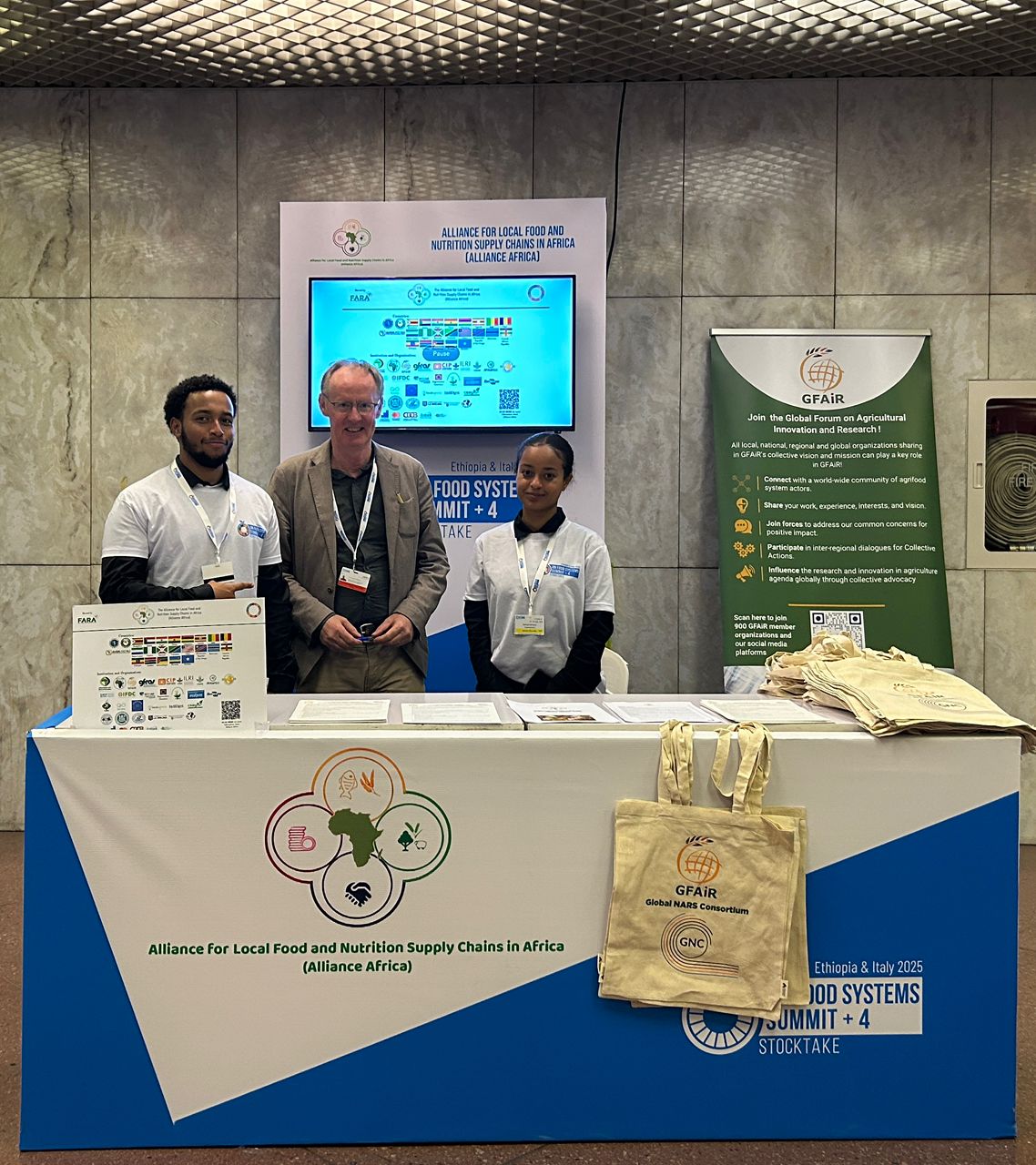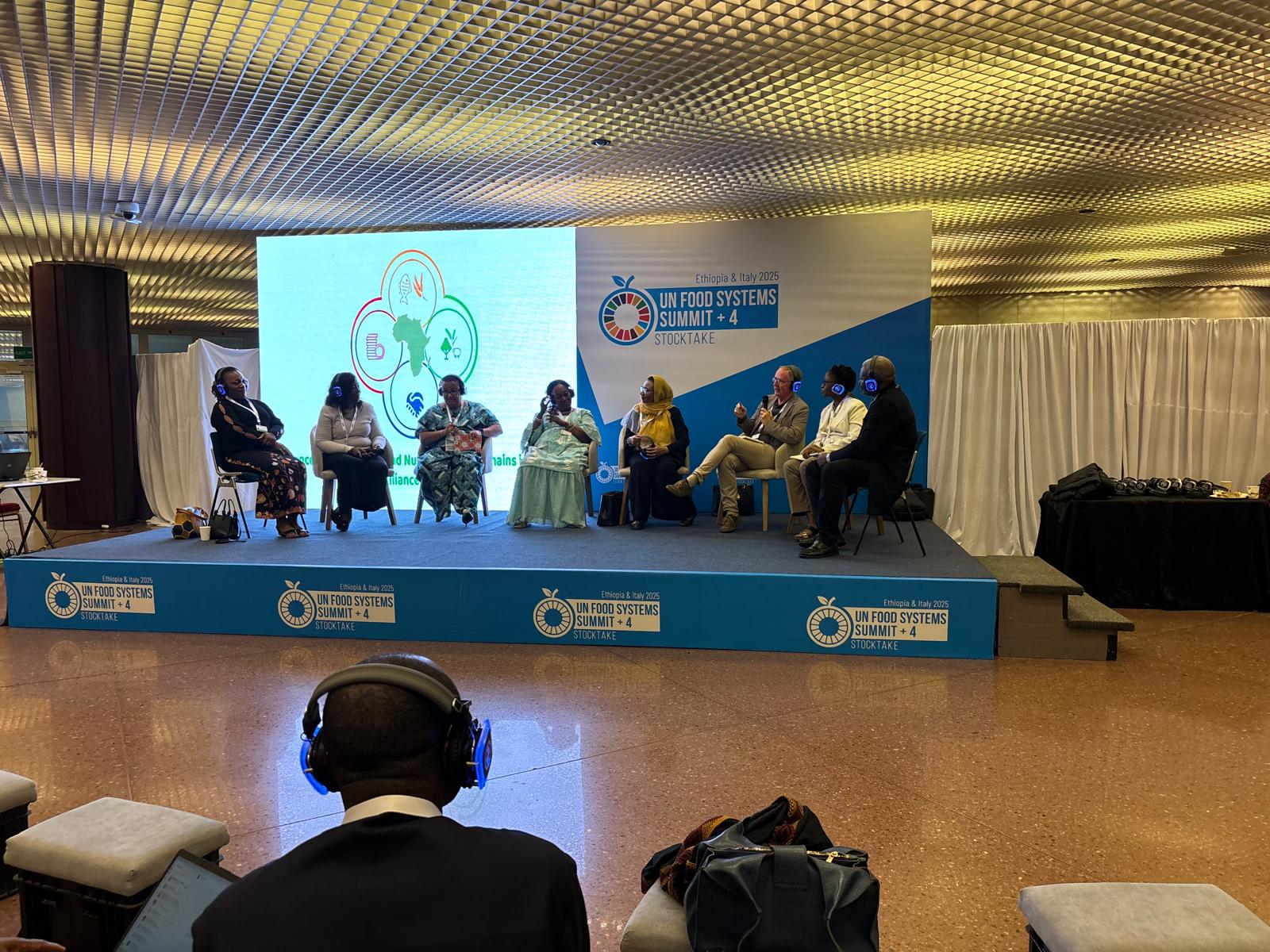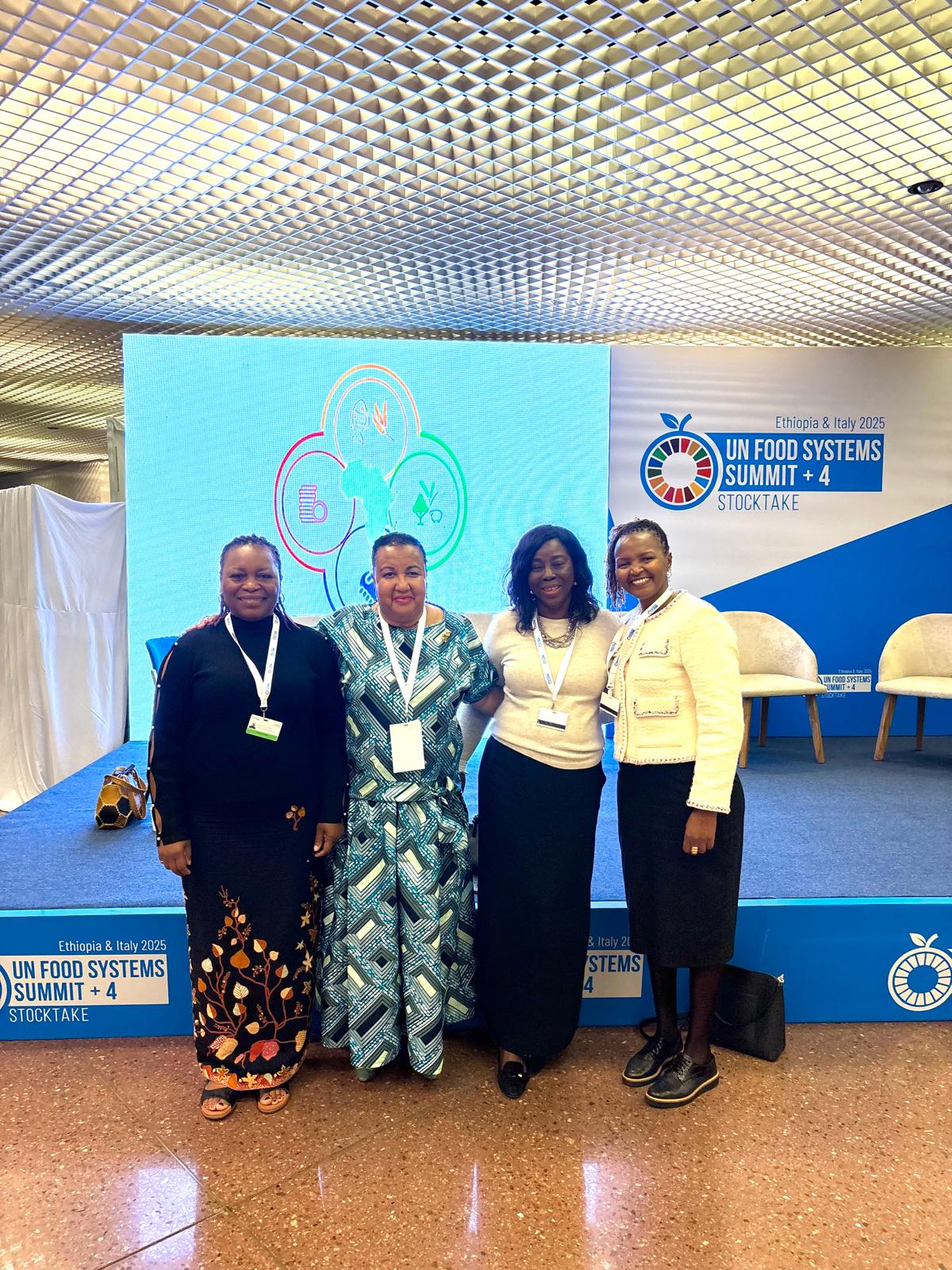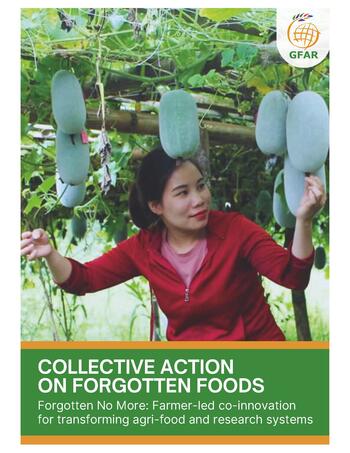
27–29 July 2025. Addis Ababa. 2nd UN Food Systems Summit Stocktake (UNFSS+4)
The Global Forum for Agricultural research and Innovation (GFAiR) partnered with the Alliance for Local Food and Nutrition Supply Chains in Africa (Alliance Africa) during the UNFSS+4 to support African countries in their policy priorities and actions to strengthen/establish efficient and effective resilient local food and nutrition supply and value chains.
- GFAiR is leading a global Collective Action on Forgotten Foods.
- The African country-led Alliance Africa is committed to work with its partners from the public and private sectors, as well as civil society partners. Its mission is derived from and is aligned to outputs from country meetings/dialogues, surveys and review of countries’ national food systems transformation pathway documents.
The collaboration between the Global Forum for Agricultural Research and Innovation (GFAiR) and the Alliance for Local Food and Nutrition Supply Chains in Africa (Alliance Africa) is vital as it brings together global innovation and research capacity with grounded, country-led priorities to transform Africa’s food systems.
By aligning GFAiR’s leadership in promoting underutilized, nutrient-rich forgotten foods with Alliance Africa’s mission to strengthen local food and nutrition supply chains based on nationally defined transformation pathways, this partnership ensures that evidence-based solutions directly support African countries' policy actions. Together, they offer a powerful platform during the UNFSS+4 to drive inclusive, resilient, and sustainable local value chains that reflect both scientific advancement and local realities.
On 26 - 30 April 2025 a field visit was conducted by the Forgotten Foods Consortium and Food Bridge, supported by the Global Forum for Agricultural and Innovation Research (GFAIR). The Executive Secretary of Alliance Africa joined the field study (the study can be read here).
Joint boot at the UNFSS+4

Alliance Africa held a booth in the Exhibition Hall at the UNFSS+4, facilitated by the UNFSS Coordination Hub, and jointly with the Global Forum for Agricultural Research and Innovation (GFAiR). Alliance Africa will also be attending the Africa Food Systems Summit
2025 in Dakar, Senegal on 31 August – 05 September 2025.
The Alliance for Local Food and Nutrition Supply Chains in Africa (Alliance Africa) was the last to be approved by the Hub because it underwent a reconstitution process following the withdrawal of the World Food Programme (WFP) from the original Coalition for Action that emerged from UNFSS Action Track 5. This required African country convenors to consult extensively and form a new, independent African-led structure, registered as a non-profit organization with an all-African membership. The shift from a global coalition to a regionally grounded alliance with its own governance, priorities, and policy orientation meant additional time was needed to ensure alignment with both the countries involved and GFAiR’s values and criteria—hence the later approval date of 21 March 2025.
The Alliance Africa’s focuses on providing support to African countries and addressing the following priority areas:
- nutritious local food and crop varieties in Africa;
- appropriate local policies and programmes such as home-grown school feeding, local food procurement, local production for local consumption of nutritious local food;
- supporting local farmers and small and medium enterprises (SMEs) in the agri-food sector, with a focus on women and youth businesses; and
- supporting and contributing to continental and regional programmes.
Members Forum: All African countries (African Union member states) are deemed members of Alliance Africa. Membership will also be opened to other interested countries and partners both in and out of Africa, especially those expressing their interest in contributing their
expertise and resources to the collective mission of Alliance Africa. The process and criteria
for membership will be outlined in the Constitution.
A growing membership: The current committed member countries, as at November 2024, are Burundi, Cameroon, Democratic Republic of Congo, Ghana, Liberia, Mauritius, Niger, Nigeria, Sierra Leone, Sudan, Tanzania, Uganda and Zimbabwe. The African Union Development Agency/NEPAD (AUDA-NEPAD) and the Economic Community of Central African States (ECCAS) have provided steadfast support to Alliance Africa.
Board of Directors:
- Ms Jeanine M Cooper, Chair of the Board. Liberia Presidential Envoy on Climate Change, former Minister of Agriculture of Liberia with responsibility for Food Systems Transformation
- Dr Verona Parkinson, Board Member. Chair of the Board of the Southern Africa Regional Forum for Agriculture Advisory Services (SARFAAS); Board Member of the Global Forum for Agricultural Advisory Services; Board Member of the African Forum for Agricultural Advisory Services (AFAAS)
- Dr Harold Roy-Macauley, Board Member. Former Executive Director of the Council for West and Central Africa Agricultural Research for Development (CORAF); former Director General of AfricaRice (a CGIAR institution); former Director of Regions and Partnership of CGIAR; currently Secretary General of Reach Workforce Foundation and CEO JADYFA SERVICES SUARL
- Dr Sanjo Faniran - Board Member. National Convenor for Food Systems Transformation in Nigeria; Director, Social Development Department, Federal Ministry of Budget and Economic Planning.
- Dr Sloans Chimatiro - Board Member, President of the African Union (AU) Policy Research Network for Fisheries & Aquaculture in Africa.
- Ms Samira Hotobah-During, Board Member and Executive Secretary of Alliance Africa, heading the Secretariat and managing the operations of Alliance Africa
“FARA’s collaboration with the Alliance for Local Food and Nutrition Supply Chains in Africa, that has a strong country-based membership, can extend FARA’s reach in countries and strengthen linkages between the stakeholder base of both organisations”. Dr Aggrey Agumya, the Executive Director of FARA
Side event 28/07 Partners of the Alliance for Local Food and Nutrition Supply Chains in Africa
Partner Talk

The format of this panel of exchanges with the member countries of Alliance for Local Food and Nutrition Supply Chains in Africa (Alliance Africa) included several country Food Systems convenors/representatives: Cameroon, Central African Republic, Democratic Republic of Congo, Liberia, Sudan, Sierra Leone. (see some representative in the picture)
They took time out of their busy schedules with their governments. Somalia and Uganda committed but could not attend. The panel also included CIP/CGIAR and GFAIR.
Panelists:
- Tobin Ondoa -DA convenor Cameroon
- Armelle Siopathis - Food Systems Convenor Centeal African Republic
- Amira Elawi Food Systems convenor - Sudan
- Julie Tshilombo - on behalf of the DRC
- Joyce Maru, Africa Director, CIP/CGIAR
- Jeanine Cooper Chair of the Board of the Alliance Africa, Liberian Presidential Envoy for Climate Change and the Blue Economy
- Moderated by Francois Stepman, Advisor of GFAiR
From left to right: Ms Julie Tshilombo of the DRC, Ms Samira Hotobah-During, Executive Secretary and Board member of Alliance Africa; Ms Jeanine Cooper, Board Chair of Alliance Africa and representing Liberia; Ms Nenebah Jalloh of Sierra Leone, Dr Amira Abdelrahim of Sudan, Mr Francois Stepman of GFAIR, Ms Armelle Siopathis of Central Africa Republic and Mr Tobie Ondoa Manga of Cameroon Credit: Alliance Africa.
The Alliance Africa Partner Talk was led by the Board Chair of Alliance Africa, Jeanine M. Cooper and Samira Hotobah-During, the Executive Secretary of Alliance Africa. The moderator was Francois Stepman of the Global Forum for Agricultural Research and Innovation.

Ms. Hotobah-During in her introduction pointed out the importance of the session as a way to bring together African countries as members of Alliance Africa, not only to exchange on actions in their countries on food and nutrition supply chains but also to explain their commitment to this Alliance.
The Board Chair of Alliance Africa, Jeanine M. Cooper, opened the session by explaining the Alliance and the role it plays in food systems partnerships. She unpacked the title and explained the evolution from the original Coalition of Action that emerged from Action Track 5 during the UNFSS in 2021. In particular, it emerged during the UNFSS+2 in 2023 that there were differences in orientation, in perspective and in proposed action among the country members of the original Coalition. In late 2024, the World Food Programme withdrew its support from the Coalition. A subsequent consultation amongst Africa Conveners in late 2024 led to the decision to form a new Alliance, registered as an African non-profit. With an all-Africa membership, Alliance Africa looks for policy intersections and south-south cooperation opportunities on getting local foods to market; building the case to scale local foods for better nutrition and then for food systems transformations.
The format of the Partner Talk was based on exchanges with countries of Alliance Africa represented by several country Food Systems convenors/representatives: Cameroon, Central African Republic, Democratic Republic of Congo, Liberia, Sudan, Sierra Leone and CIP/CGIAR. The contributions from the countries were instructive.
The countries restated their commitment to Alliance Africa and, specifically, the importance of having Alliance Africa as a platform that:
- connects African countries regularly to interact and exchange on their progress in food and nutrition in their respective countries.
- conducts advocacy on their behalf and supports them to highlight the importance of local production of indigenous local foods, including fish and livestock; including analysis of nutritional values;
- advocates for greater investment in local foods and in the producers of those foods, especially farmers, youth, small businesses and the challenges they face;
- supports local advocacy for local policies such as local production and consumption of local foods and local procurement for institutional and for humanitarian needs; to support and invest in local production with the goal of stopping importation of food for humanitarian assistance and ensure local procurement of food for their school feeding programmes ;
- notwithstanding instability and conflict in some countries, advocate for investment in areas of stability within conflict-affected countries across the continent
- provides connection and facilitation between countries and research institutions to ensure uptake of research technologies to enhance nutrition outcomes;
- advocate for reducing importation of food and redirect that expenditure to local food production, to stimulate local markets and increasing local income
Individual country contributions were as follows:
Central African Republic (CAR): CAR’s National Convener for UNFSS, Ms Armelle Siopathis, Director of Food Safety and Nutrition, Ministry of Agriculture and Rural Development (MADR) explained that CAR is a heavily forested country with rural populations heavily dependent on local foods. Despite widespread consumption, these foods are not catalogued, rarely enter into national statistics and therefore are not valued. It is difficult to talk about strengthening or transforming food value chains when local foods are not taken into account, without any analysis of nutritional values or toxicity of local foods.
Sudan: Dr Amira Abdelrahim, Food Systems Convenor, explained that Sudan faces recurrent food and nutrition insecurity due to climate change and experiences problems with the supply of agricultural inputs. Many of the food processing facilities were destroyed by war and these are setbacks to national food systems transformations. They are looking at ways to support small farmers and youth in agriculture. Through their participation in the UNFSS Coalition for Healthy Diets, they have begun projects in five areas in the country on nutrition and school meals.
Cameroon: Tobie Ondoa Manga, Inspector General of Agricultural Development, Ministry of Agriculture and Rural Development, reported that Cameroon is also a heavily forested country hosting a significant number of refugees. They find value in the Alliance Africa because of the commonalities with the other member states. Mr Manga pointed out that the Malabo Declaration calls for an increase in regional trade but for example, World Food Programme (WFP) purchases food for the refugee camps from outside the region. In addition, WFP’s School Feeding Programmes do not source from local producers, but instead from Europe and Asia. He pointed out also that research into food production systems do not take into account mountainous soils such as there are in a number of countries. Alliance Africa is highly relevant for the shared experiences and dialogue that is possible among African countries.
Sierra Leone: Ms Nenebah Jalloh, National Coordinator - Scaling up Nutrition Secretariat and National Curator - Food Systems. Ms Jalloh informed the panel that in Sierra Leone, a ‘Feed Salone’ strategy was developed as a whole of government effort. Because local foods are not valued in national policy making and because of the efforts to integrate nutrition in this strategy, the name of the Strategy is now ‘Feed and Nourish Salone’ to place emphasis on the value and importance of nutrition.
Democratic Republic of Congo (DRC): Mme Julie Tshilombo, Directrice-Coordinatrice of the Delivery Unit - Priorite Structurantes pointed out that the DRC with its rich soils is as vast as the European continent. Food production is not the main problem but the logistics and infrastructure challenges of getting locally produced foods to markets and/or consumers is the primary concern. The energy needs for food processing and storage facilities is a growing concern in the face of Climate Change and the need for an energy transition. The country is championing clean cooking stoves. The country is vast and it is fragmented so one-size-fits-all solutions are rarely optimal. She informed us that the DRC currently spends USD3.5billion every year on food imports, close to 25% out of a national budget of USD16 billion. Additionally, the imported food does not reach the 70% of the population living mostly in rural areas, including the most vulnerable in both rural and urban areas who cannot afford to buy the imported food. Ms Tshilombo pointed out that if a fraction of that same USD3.5billion goes to support small farmers and SMEs to produce food locally instead that will change the landscape of local food supply and nutrition in the DRC. Facing similar challenges, it now becomes important for African countries to talk amongst themselves and find solutions together.
International Potato Center (CIP/CGIAR): Dr Joyce Maru, Regional Director for Africa spoke of the links between research and practice, especially with regard to local crops and local foods. Improvements in researched varieties must reach the local producers for that research to be useful. CIP/CGIAR are supporting research into the agroecology of plant production, including irrigation systems, and cited the Rwanda example for the successful production of the orange-fleshed sweet potato. Current research is in making baby food produced from sweet potatoes to be shelf stable.
Sarah Robert from the State University of New York asked a question from the audience on regenerative agriculture practices and how these were featuring in food systems transformation.
Ms Jeanine Cooper, Alliance Africa Board Chair responded that without large-scale supplies of harmful chemicals and production inputs, many, if not most, local foods in Africa are produced organically. Monocropping is not traditional in African food production systems which makes these less harmful to the environment and the emissions of greenhouse gases.
In attendance was Prof. Grace Mbong, the National FS Convenor of Cameroon. Going forward, Francois Stepman of GFAIR proposed a webinar by Alliance Africa to explore further these topics that were raised as ways for the Alliance Africa to add value to its membership. He cited the Ajinomoto Foundation that might be willing to work on some of these issues and finding nature-based solutions to aid food systems transformation in Africa.
THIS SESSION WILL BE FOLLOWED UP BY A JOINT WEBINAR - date to be confirmed
Side event 27/07. Showcasing Nigeria's Innovations and Collaborations in Food Systems Transformation
READ THE FLYER | PROGRAMME
Organizers and partners: Federal Ministry of Budget and Economic Planning (FMBEP); Federal Ministry of Agriculture and Food Security; FAO, WFP, IFAD, GIZ, GAIN, GFAiR.
This event highlighted innovative, locally driven initiatives and policy advancements, showcasing Nigeria’s leadership in building resilient, equitable, and sustainable food systems. Through integrating grassroots actions with national and global goals, Nigeria is generating scalable, evidence-based solutions that advance gender equity, youth empowerment, and climate resilience. The event aims to share successes, foster collaboration, mobilize resources, and amplify underrepresented voices, positioning Nigeria as a model for inclusive food systems reform and inspiring similar efforts globally.
- Opening Remark - among others:
Ms. Jeanine Cooper, Board Chair & Director, Alliance for Local Food and Nutrition Supply Chain in Africa (Alliance Africa) and Former Minister of Agriculture, Liberia, was represented by Ms. Samira Hotobah-During, Director, Coordinator and Focal Point Alliance Africa.
Ms. Dede Ekoue IFAD Nigeria Country Director (UN Nigeria Rep) - Keynote Address and Official Opening of the Session: Senator Abubakar Kyari, CON, Honorable Minister of Agriculture & Food Security, Nigeria
- Dr Sanjo Faniran, National Food Systems Convenor of the Federal Republic of Nigeria, board member Alliance for Local Food and Nutrition Supply Chains in Africa (Alliance Africa)

